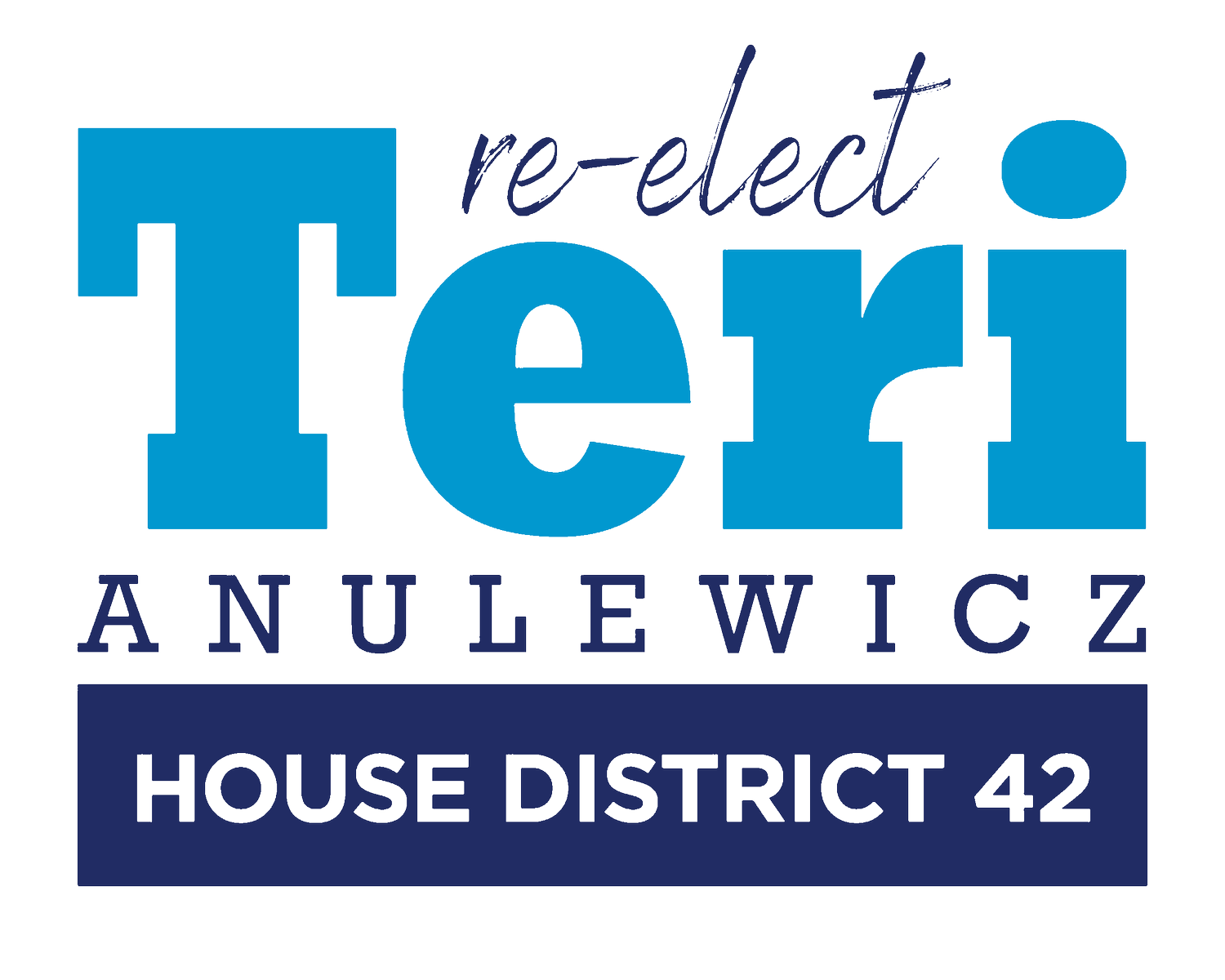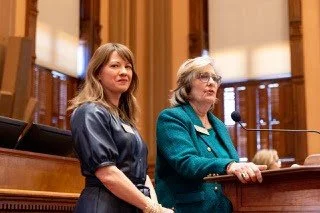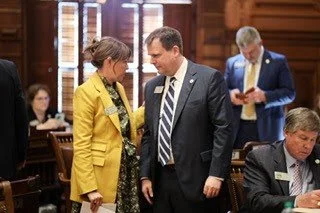NEWSLETTER: Week 5 of the Legislative Session
Legislative News
The Georgia General Assembly returned to the State Capitol last Tuesday, February 6 for a busy fifth week of the 2024 legislative session. The House assembled for four days, and our days are certainly getting longer and busier as we move further along in the session. We successfully gave passage to several bills and continued our committee work. Some highlights of the week include the passage of the House’s version of the Amended Fiscal Year 2024 budget (AFY 2024), among other bills, as well as the convening of a joint legislative session for the annual State of the Judiciary address.
The Amended Fiscal Year 2024 budget, or House Bill 915, is set at a revenue estimate of approximately $37.5 billion. Governor Kemp’s estimate for the amended budget includes $2 billion in surplus funds, bringing the total to $5 billion, and marking a 15.6 percent increase from the original estimate. The Amended FY 2024 budget provides substantial investments in technology, capital improvements, safety and security initiatives, economic development projects, and human capital enhancements.
The House’s amended budget continues to prioritize economic development in our state and has aligned with the governor’s proposal to allocate funding for several key economic development initiatives. In the House’s version of the AFY 2024 budget:
$23.9 million is designated to the Rural Workforce Housing program, aimed at enhancing and expanding the availability of workforce housing
$250 million for low-interest loans to the Georgia Fund, which would be dedicated to water and wastewater infrastructure development in local communities
$100 million for economic development initiatives through the Regional Economic Business Assistance program
$100 million to the OneGeorgia Authority for rural economic development and site enhancement projects
$178 million toward establishing a new dental school at Georgia Southern University in Savannah
$50 million for the construction of the Medical School at the University of Georgia
$4.75 million to support necessary funding for staff and facility operations within the Quick Start program; this program addresses the growing workforce needs of our state by providing customized workforce training
$19.5 million for the Technical Education program within the Technical College System of Georgia to fund renovation and start-up costs for three Workforce Accelerator site locations in order to sustain the electric vehicle industry in the state
$102.5 million allocation to the Department of Education (DOE) for the midterm adjustment of the Quality Basic Education Formula, reflecting an increase of 825 students from the previous year
$1.57 million to expand the Communities in Schools program, which is dedicated to supporting students in areas like attendance, behavior, academic performance, retention and graduation.
$8.9 million in lottery funds to sustain the Summer Transition Program through the Department of Early Care and Learning to provide support to rising Pre-K and kindergarten students in subjects like language, literacy, and math to ensure they are better prepared for academic success
$3.9 billion for transportation infrastructure, and, of this, $509 million is dedicated to the new Freight Infrastructure Projects program to enhance Georgia’s growing freight network
$200 million is allocated as a one-time deposit for the Local Road Assistance Administration Program to improve local transportation infrastructure projects statewide
$4.25 million in this budget to continue upgrading the state-owned rail lines to Class II standards, facilitating faster train speeds and improved integration of lines
$110,000 for the implementation of visible watermarks on all paper ballots to enhance election security
$500 million to improve the health and funding ratio for the Employees Retirement System of Georgia
$300 million for a one-time salary supplement of $1,000 for state employees and teachers
$2 million to the Department of Behavioral Health and Developmental Disabilities to implement alternative transportation methods for those facing a mental health crisis
$1 million is designated for the Georgia Department of Veterans Services to support the Veterans Mental Health Services Program
$4.6 million to establish 400 transitional beds at the Metro Re-entry Center, which offers crucial resources to former inmates upon release, including employment assistance, access to social services, housing support and programming for family reunification
The House’s version of the AFY 2024 budget now heads to the Senate and will likely undergo changes before receiving final passage.
In addition to voting on the amended budget this week, the House also gave unanimous passage to a legislative package aimed at providing Georgians and their families with much-needed tax relief. On Thursday, the House took up House Bills 1015, 1019 and 1021.
HB 1015 would lower the individual income tax rate effective on January 1, 2024, from 5.49 percent to 5.39 percent, which would return another $1 billion to Georgia taxpayers
HB 1019 would increase the statewide homestead exemption from $2,000 to $4,000, provided the owner resides in the home as their primary residence
HB 1021 would increase the child tax deduction from $3,000 to $4,000. With rising childcare costs, this legislation would allow for an extra $1,000 deduction per child, which could help alleviate some of those costs for parents.
Each of these measures would help foster Georgia’s economic success story by returning more dollars back into the pockets of our taxpayers.
We unanimously passed House Bill 1035, bipartisan legislation that would allow for the sale and supply of opioid antagonists, like Narcan, in vending machines, while protecting those who dispense, supply and administer these opioid-overdose reversal drugs from liability when they act in good faith. This bill would certainly save lives in Georgia by expanding access to these critical overdose reversal drugs.
We also focused our efforts on passing legislation that would maintain and expand the eligibility and update funding mechanisms for the Realizing Education Achievement Can Happen (REACH) scholarship.
House Bill 970, would expand eligibility of the scholarship to victims of human trafficking. Also, this bill would authorize REACH participating school systems to designate REACH scholars each school year to receive the $10,000 scholarship without a limit on the number of recipients from each school, subject to available appropriations. Finally, HB 970 would realign state and local funding by requiring REACH participating school systems to provide $1,000 toward the funding of the scholarship, and the state would be responsible for appropriating the remaining $9,000 toward the scholarship through Georgia Student Finance Authority. I was proud to support this important measure that would encourage and expand higher education opportunities for our students.
Aside from passing legislation last week, we held a joint session of the House and Senate on Wednesday where Chief Justice Michael P. Boggs delivered the annual State of the Judiciary Address to the members of the General Assembly. Chief Justice Boggs provided a comprehensive update on the state of Georgia’s judicial system, highlighting its continued strength in recent years. He reported a decline in pending serious violent felony cases alongside a notable increase in overall jury trials, indicating positive trends within the judiciary.
The Georgia House of Representatives will resume its legislative work on Monday, February 12 to begin our sixth week of session. The pace under the Gold Dome is surely picking up as we approach the looming “Crossover Day” deadline. Crossover Day is the last day that a bill can pass out of its chamber of origin and still be eligible for consideration this session. As we approach this deadline, I encourage you to reach out with your questions or concerns regarding any legislation that we are considering.
Cobb County School Board Maps Updates
Addressing the court-ordered redistricting of the Cobb County Board of Education has been a major focus of my time and energy this legislative session. You may recall that in March 2022, the General Assembly passed a Board of Education map using procedures that bypassed the local legislative process and was instead pushed through the House and Senate via the general legislative calendar. This was HB 1028.
Litigation was expected, and Finn v. Cobb was filed in June 2022 with the goal of blocking implementation of that racially gerrymandered Board of Education map. The case asserts that, "The Cobb County Board of Education in Georgia and state legislators used racial demographic information to ‘pack' communities of color — particularly Black and Latinx voters — into three of seven school board voting districts to diminish their political power and preserve a white majority on the board. More info here.
On December 14, 2023, United States District Court Judge Eleanor Ross granted a preliminary injunction to the defendants in Finn v. Cobb County Board of Elections and Registrations. This order was issued after the conclusion of the Special Session of the General Assembly for reapportionment in November and December, 2023, and we were obliged to wait until the convening of the 2024 regular session on January 8 to proceed with the legislative process for this reapportionment. Here is a thorough overview and FAQ about the case. You can review the court order here.
Judge Ross’s preliminary injunction specified that the General Assembly pass a new map by January 10, 2024. As that was Day 3 of the 2024 legislative session, and per the Georgia Constitution it is not possible for a bill to pass both chambers within three legislative days, the plaintiffs requested, and were granted, an extension to January 22, 2024, day 6 of the session.
On Day 1 of Session, January 8, I presented a proposed map to the Cobb County Legislative Delegation, per our local delegation rules that are on file with the Intergovernmental Coordination committee. The bill that I sponsored, and that complies with all Cobb delegation rules including having the signatures of the majority of the members of the House representing Cobb County, is HB 989. Having met all delegation requirements, that bill was placed on the House Local Legislation calendar.
At that same meeting, Senator Setzler also shared his proposed map with the delegation. This was SB 338. Meanwhile, the 11th Circuit Court of Appeals issued two opinions related to the case on Friday, January 19. The first opinion hit pause on Judge Ross’s order enjoining the map until it was determined whether Cobb County School District (CCSD) had standing in the case. The second opinion dismissed the CCSD's appeal saying that they lacked standing in the case. More details here. (Yes, it’s confusing.)
On Wednesday, January 24, SB 338 passed the Senate with a party line vote. Despite not being in compliance with House rules and with Cobb delegation rules, SB 338 was also placed on the House Local Legislation Calendar, and on January 29, both maps passed the House. On Tuesday, January 30, Governor Kemp signed SB 338 into law and — barring further action from the 11th Circuit, which is definitely not outside the realm of possibility — the map that lacks the support of the majority of the Cobb delegation will be in effect for the upcoming Board of Education elections.
This outcome is disappointing — but ultimately, it is unsurprising given the reality that the Board of Education is the last bastion of GOP control in Cobb County, and the only way the GOP can continue to be the majority party on the Board is if that map are gerrymandered in a way that preserves that majority.
The process that preceded the passage of SB 338 was one that lacked any collaboration with, and input from, other members of the Cobb delegation. It passed despite not meeting the necessary delegation requirements. It is not the product of any attempt at consensus. It is not a map that reflects the population in Cobb, and ultimately, SB 338 is a map that does a tremendous disservice to every student and family in Cobb County’s public schools.
Under the Gold Dome
Announcing Girl Scout Day at the Capitol
Meet my new friend Charlie. He’s cold-blooded which means he was right at home at the Capitol. Charlie is three years old and he visited from his home down in the Okefenokee Swamp (an actual swamp, not a political euphemism) to remind us that protecting our wetlands is a critical responsibility.
Discussing legislation with Rep. Franklin
Remembering Van Pearlberg
The State of the Judiciary with Georgia Supreme Court Justice, Sarah Warren and Presiding Justice (and Cobb resident) Nels Peterson








